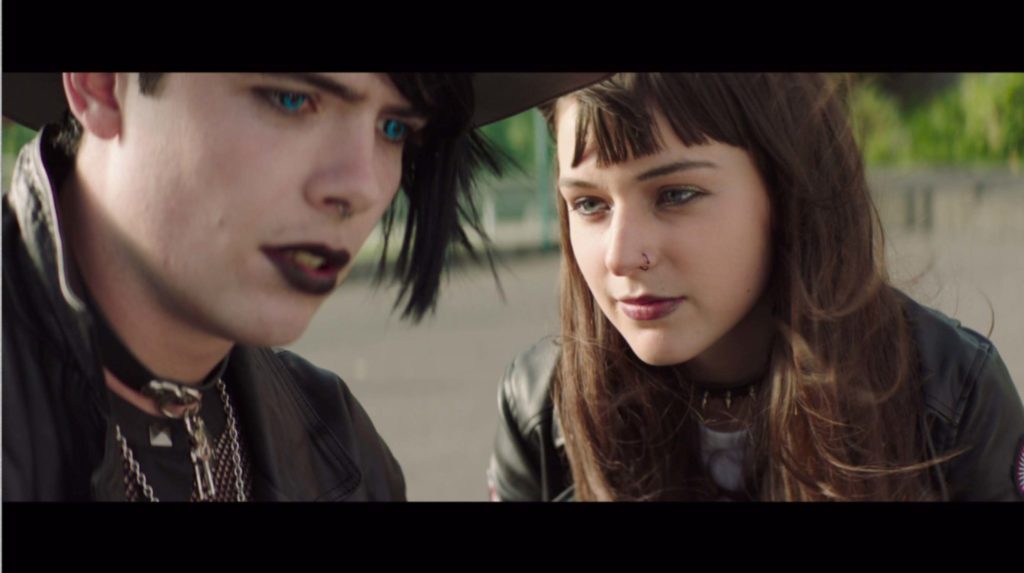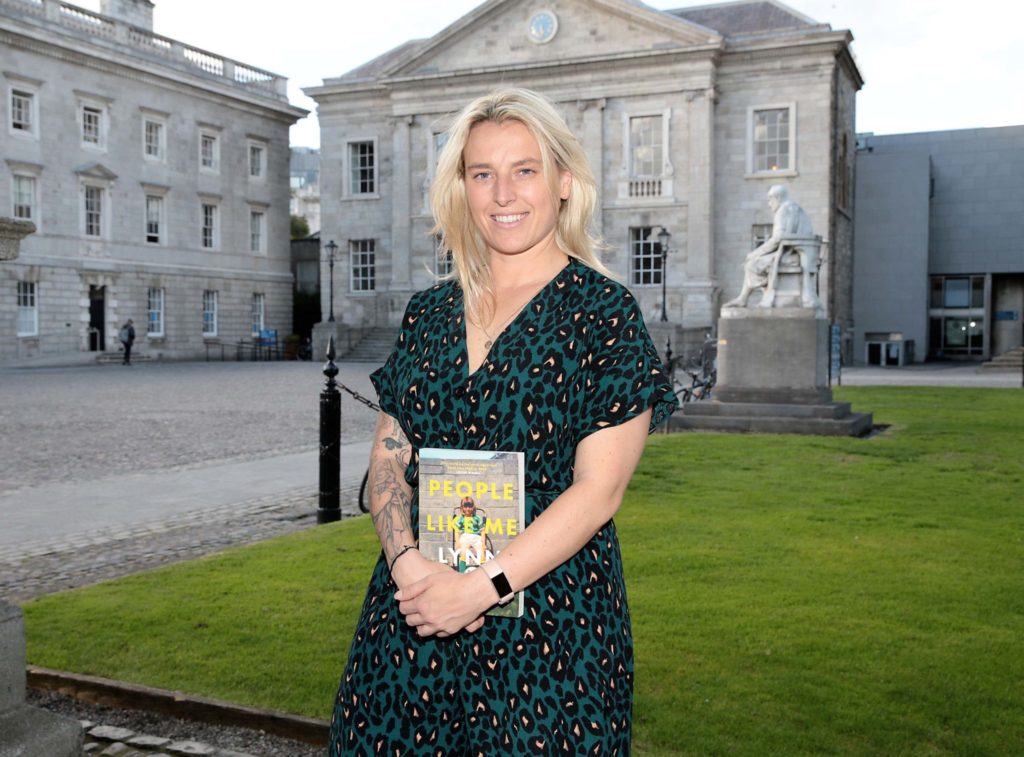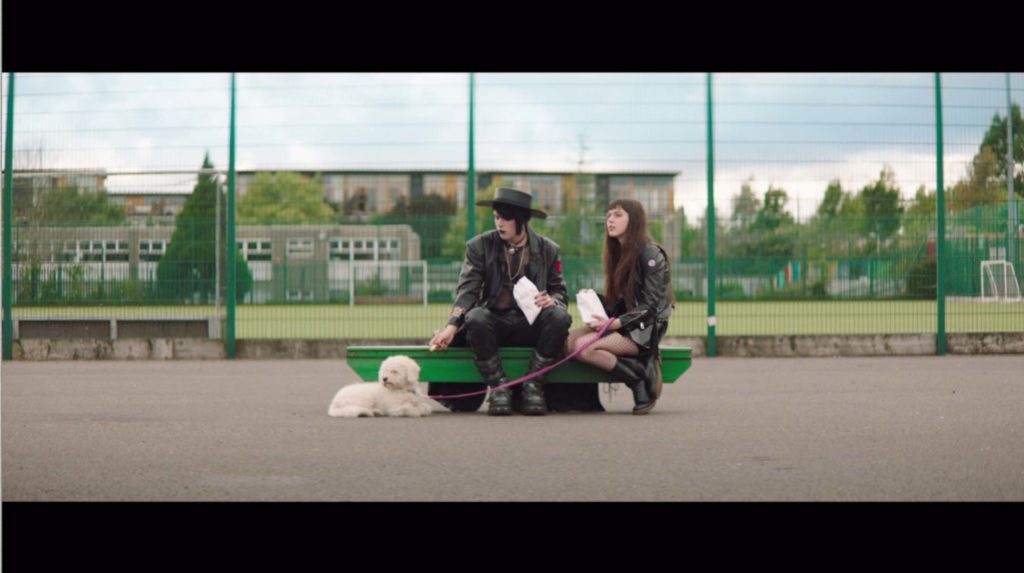- Film And TV
- 03 Jul 19
Jordanne Jones: On Metal Heart, mental health, and her love for Dublin

A hugely gifted teen actor, Jordanne Jones talks about her stunning performance as an alienated youth in Hugh O’Conor’s Metal Heart, mental health, and the pride she feels in her working class Dublin background.
Jordanne Jones has never been one to wait for opportunities to come to her. At age 12, the Tallaght native walked into an audition for Frank Berry’s film I Used To Live Here, a beautiful portrayal of grief and complexity among young people impacted by suicide. Jones’ performance was astonishing, earning her a well-deserved Oscar nomination. Since then, she has starred in the TV mini-series Resistance and Rebellion, and featured in Emmet Kirwan’s spoken-word piece, Heartbreak, which became a viral sensation.
Jones’ talent, determination and warm, friendly personality are immediately apparent upon meeting her. Yet, the young actress says that it has sometimes been easier to feel at home onscreen than in real life.
“I was the outcast growing up, I found it hard to fit in sometimes,” the 19-year-old says, sitting in Bewley’s on Dublin’s Grafton Street one sunny afternoon. “I always had a different taste in style, or music and film. I was always a big horror movie buff: I loved things like The Rocky Horror Picture Show. My Dad introduced me to a lot of the classics – American Werewolf was one of my favourite films growing up.
“My cousin Holly was only a few years older than me and introduced me to a lot of great bands like Queen. So I fell in love with a lot of quirky things, and definitely went through a period where I wore all of that on my face and my clothes! It was pretty rough in school for a while because I was different. Sometimes I did think I should just shove on a pair of leggings and a Michael Kors bag, to fit in, and make things easier, but as someone who loves to paint and act and be artistic, expressing my self was so important.”
It’s an odd and intimidating thing, to realise as a teenager that the world is not always accepting of people’s individuality. But thankfully, Jones soon realised that her ability to express herself and be authentic was a gift, and not something to be ashamed of – even if other people seemed to feel threatened by the confidence it takes for a young woman to be unapologetically herself.
“Once I was upset because someone had said something nasty to me because I was different,” she recalls. “My friend said to me, ‘Of course they’re offended – you’re wearing the enemy’s uniform!’ And I just thought, ‘That is so cool!’ It felt so empowering! I felt like such a badass, wandering around school after that, thinking, ‘You’re all offended by me, you can’t touch me!’”
Jones revisited these conflicting feelings of isolation and individuality for her latest role. Starring in Hugh O’Conor’s directorial debut Metal Heart, she plays Emma, a sensitive and artistic goth, who feels as though she’s always living in the shadow of her blonde, popular twin sister, Chantal. Jones’ own experiences as a teenager who loved alternative films, music and fashion, and rebelled against conformity, allowed her to understand her character, who strikes up a relationship with an older and potentially toxic neighbour, played by Moe Dunford.

“I could definitely relate to Emma,” she says, “because I had that sense of angst, but also a determination not to change who I was. My favourite book is Catcher In The Rye, and I think Emma is such a Holden Caulfield – ‘Everybody’s a phony and nobody gets me!’ I understood that feeling.”
Jones had previously acted alongside Metal Heart director Hugh O’Conor in Resistance, and the two struck up a comfortable, respectful and collaborative relationship which she deeply values.
“I had never worked with a director who was also an actor, let alone an actor I had worked with before,” Jones says. “It was so comfortable working with him, and the atmosphere was really supportive. He had such a great approach to directing actors, it felt so beneficial.”
She shared O’Conor’s love of classic coming-of-age films, like those made by John Hughes – but also pointed out how films about teenagers perpetuate stereotypes. For example, Jones wanted to avoid telling young women that they all have to look and dress the same, to be seen as attractive, likeable or mature. Unfortunately, that’s a message that pops up again and again in teen films – including, of course, Ally Sheedy’s final makeover from eyelinered goth into pastel-hued princess at the end of The Breakfast Club.
“All those stereotypes, I wanted us to be really careful with,” she explains. “I definitely did have a lot of say in that, and was so lucky that I had a director and production that really listened to me and took that seriously. There was a notion that by the final scene, Emma’s style would have lightened up a lot and wouldn’t be as dark, and I really didn’t want that – the idea that conforming is better. I wanted her to be able to grow as a person, while still having her own individual style.”
One beautifully observed aspect of the film, which was written by the novelist Paul Murray, is how the two sisters have different accents to each other. Chantal, who is an online beauty influencer, has a noticeably affected Dublin 4 accent, while Emma’s is more neutral – though it’s different to Jones’ own Tallaght twang.
 SONY DSC
SONY DSC“I was nervous about the accent,” she admits, “because it was the first time I had to do a different one to my own. I was nervous it would come across like I was trying too hard – but then we realised that both of the girls are trying too hard, both trying to be a certain person, and that felt very true to what teenagers do.”
Jones, who is the daughter of the brilliant and passionate Senator Lynn Ruane, has long understood that accents are as political as they are personal, and is determined to never change hers.
“I have a big thing around accents,” Jones asserts. “I remember my Mam getting accepted into Trinity College, and her being sceptical about going into campus with her thick Tallaght accent, and worrying that she would be judged, or that they wouldn’t take her seriously. I remember that really upsetting me. But to see my Mam own it, and take control of it, was so inspiring. Seeing my Mam standing in the Seanad with a thick Tallaght accent and she curses and has her tattoos is amazing. I’m seeing people from a working class area like myself doing these amazing things – it makes politics and art seem less foreign. People like my Mam and Emmet Kirwan, people with voices like mine, are doing their thing, publicly, and it matters. It made me feel much more confident going into Trinity, sounding like I do, not pronouncing my T’s – I never do, and I never will!” she asserts, laughing. “I don’t have time for T’s!”

Jones’ mother is a powerful and impressive activist. Having become a single mother at age 15 and overcoming addiction, Lynn Ruane has used her platform to fight for the rights and autonomy of others – a passion she instilled in her daughter early.
“I remember I was about to make my confirmation, and was like, ‘No-one asked me, do I have to do it? I never got to explore other religions or anything, so how can I choose this when it hasn’t been presented as a choice?’ Mam said, ‘No, you don’t have to do it, I should have asked’,” Jones recalls, smiling at the memory. “I decided to make my confirmation – mainly because I already had my dress, it had skulls and roses on it and I loved it! But we had to go to practice for it in the church, and I remember the priest saying, ‘You’re all getting so grown up now – I’m sure the boys will all grow up to be footballers, and the girls are going to marry them’!’ I remember looking around thinking, ‘Are we just meant to take that?’
“I always wanted to be an archaeologist and an actor, and I was so annoyed to hear someone say I should just aspire to marry someone – that should be the highlight of my life. I stood up and said, ‘I’m going to be an archaeologist!’ and I got kicked out of church! My friend Aiden was gay, and very flamboyant, and after I got kicked out, I could hear him also stand up and go. ‘Yeah, and I want to be a singer!’ I was outside going ‘Revolution!’ My Mam was delighted, she was there going, ‘Yes! My little activist!’ My Mam has always wanted me to be loud and opinionated, and to fight for what I believe in.”
With an interest in acting and archaeology, I suggest she might want to start fighting to play the lead in a female reboot of Indiana Jones.
“Oh my god, plug that!” she exclaims. “Let’s get a campaign going!” Ideal films roles aside, Jones is already using her platform to highlight issues that she is passionate about, using social media to speak out about political causes.
“I had someone in my life who took their own life within the past two years,” she says, “so my main focus now is on mental health. My Mam is also doing a lot of work supporting the Traveller community, which is something I’ve always been very passionate about.”

Ruane wrote an excellent memoir last year, People Like Me, which addressed her history of addiction, experience of sexual violence, and classism, among other things. Jones is similarly using her own experiences to address wider issues, and has openly discussed her mental health on Twitter.
“I’ve struggled with my mental health from a really young age,” says Jordanne. “I have anxiety and I have been diagnosed with Asperger’s in the past two years – and I struggled a bit with that, because I’ve never loved labels. But it has really helped me understand my little quirks, and it has also been great to find other people with Asperger’s.”
Jones has the common misconceptions about Asperger’s Syndrome and anxiety frustrating.
“I get a lot of comments like, ‘You don’t look like you have Asperger’s, or ‘But you’re really pretty!’ which is really weird and hard,” she reveals. “And with my anxiety, it fluctuates, so sometimes I’ll be fine and other times I’ll feel very socially awkward and self-conscious. But then people will say ‘You were fine at that party!’, or ‘You’re an actor and go in front of a camera, I could never do that!’ I have to do a lot of explaining, which can be tiring. That’s why I loved working on I Used To Live Here with Frank Berry, because it opened up conversations about mental health.”
Some of these misconceptions are perpetuated by pop culture portrayals of Asperger’s and autism, which often conflate the two, and associate the conditions with being a savant, or emotionally stunted.
“It’s often portrayed as being some super-power or being unemotional, but Asperger’s is so broad and affects people differently. So when I speak about Asperger’s, I’m only speaking about myself and my own experience,” she explains. “The idea that people with Asperger’s aren’t very emotional is not true for me – I’m an empath, I feel other people’s feelings very deeply and I’m sensitive. Then I have a lot of quirks: I have to stick to a very strict routine and don’t like spontaneity or unpredictability. I have sensory issues and can get really overwhelmed by noise, lights, crowds. Sometimes having Asperger’s feels like being high on cocaine or something – I’m on high alert, and it feels like I’m taking in too many things at once. It affects my memory, because it’s like there’s too much happening for it all to register. So the world feels very big and overwhelming sometimes.”
While acting may seem like a hectic and demanding lifestyle, Jones actually finds it calming, offering her an opportunity to explore her emotions and ground herself in a character.
“Acting feels very therapeutic for me, because I get to step into someone’s life and focus on playing them,” she says. “Whenever I play someone, they are a version of me, I feel connected to them, but because the characters are all different, acting also helps me grow and evolve as a person, and see the world differently through their perspective.”
This sense of empathy and compassion fuels Jones’ activism.
“Mental health isn’t linear, it doesn’t stay the same,” she ventures. “Last year was probably one of my hardest years for mental health and I probably had 30 okay or good days out of a year. But looking back at it, those 30 days were worth the bad days. And I’m okay with that. I actively work on my mental health and trying to get to as good a place as possible, but I’m also accepting that my mental health journey is a process that is never over. And it helps, because then when you have a bad time, you know that it will pass and you haven’t failed. The process will continue. People need to know that.”
Jones has just finished second year exams in her Film and English degree – “I passed! I’m coming back next year!” she reports joyfully. She loves her course in Trinity College. She’s recently become a fan of Akira and has been on a Hitchcock binge thanks to her film classes. In her free time, she is also enjoying reading Call Me By Your Name and The Princess Bride. She admits that constantly consuming masterful films is making her consider directing at some point. But for now, she’s focusing on her upcoming film, the period comedy Dead Still.
“I play a young, feisty teenager, and humour wise it’s very black. The script is amazing and my character is hilarious, so I’m really excited.” Though Jordanne admits that balancing college and acting has been tough, she’s looking forward to having more downtime over the summer.
“I do have times where I think ‘I’m so tired, I’ve a deadline tomorrow and I’m on set next week, I don’t want to do it anymore!’” she laughs. “But then I think about how lucky I am to have gotten into the course I wanted, and to get to act as my job, and how many people would love to do that – and it makes it easier to get out of bed! I am getting better at giving myself breaks and resting, so I can enjoy everything even more. I know I’m very lucky.”
• Metal Heart is in cinemas now.
RELATED

- Film And TV
- 27 Nov 25
Louisa Harland: "I miss the people and the energy of Dublin whenever I'm away from home"

- Lifestyle & Sports
- 10 Jan 25
Best of Dublin - Northside Story - Bad Sisters
RELATED

- Film And TV
- 27 Jul 19
Cassie Stokes: On Xposé, Pride, anxiety - and her favourite hometown haunts

- Film And TV
- 26 Jul 19
Dublin On Film - The Best Films To Have Used The Capital As A Setting

- Lifestyle & Sports
- 26 Jun 19
Best of Dublin 2019: Niamh Algar, Jordanne Jones and More Feature in our Massive Annual Issue

- Film And TV
- 16 Dec 25
Tributes pour in after homicide death of actor-director Rob Reiner and wife Michele

- Film And TV
- 16 Dec 25
WATCH: Netflix releases Stranger Things season 5 part 2 trailer

- Film And TV
- 15 Dec 25


